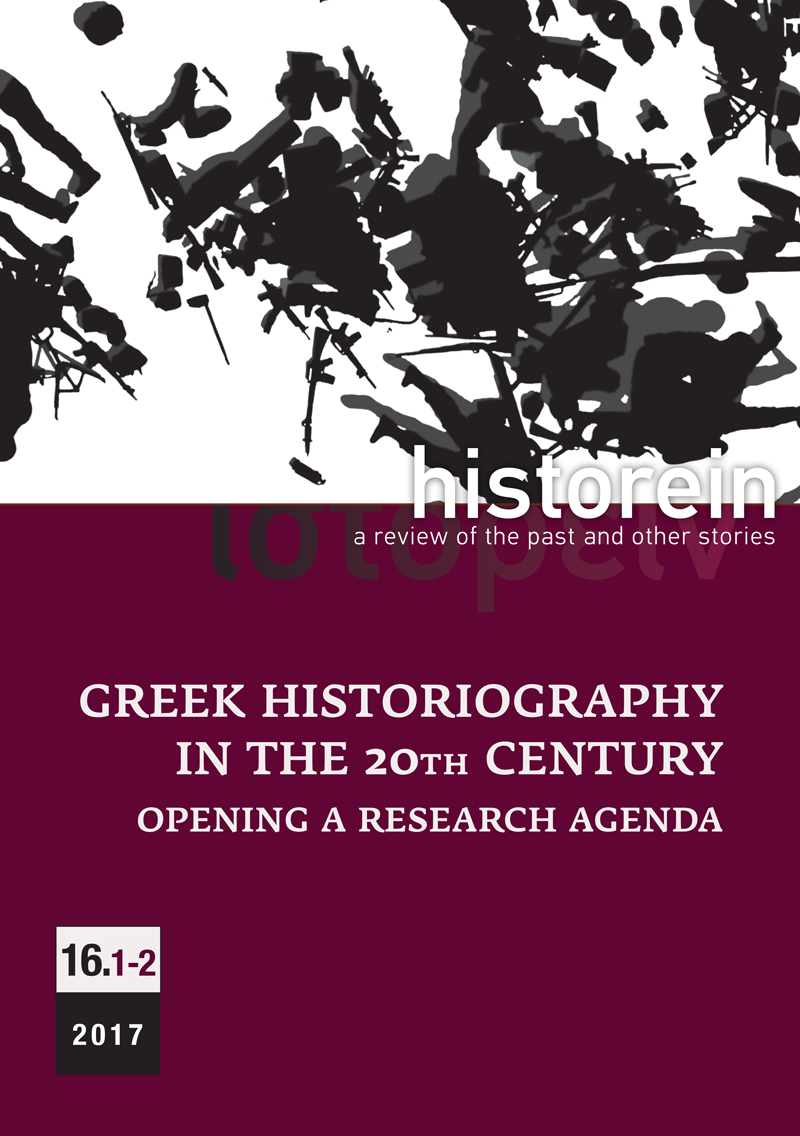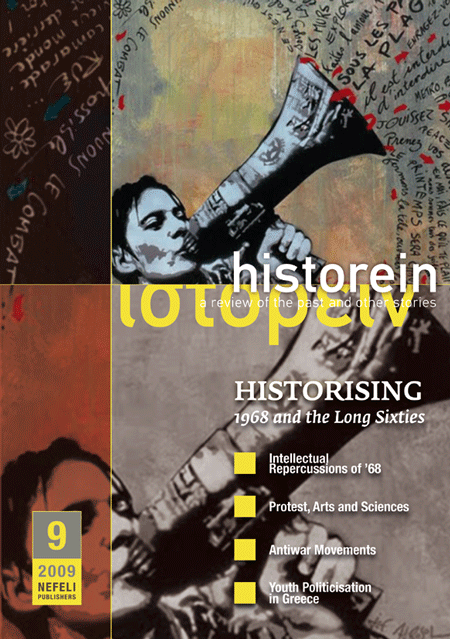From politics to nostalgia – and back to politics: Tracing the shifts in the filmic depiction of the Greek 'long 1960s' over time

Abstract
A number of Greek feature films in the 1990s and early 2000s – from End of an Era to Uranya – created a standard depiction of the Colonels’ dictatorship as an era filled with bittersweet adolescent memories. The Comedy of the Junta: The Light Side of a Dark Era, a recent documentary produced in April 2010 by Elias Kanellis, presented it as a laughable farce. More importantly, even, this period was treated as distant and definitely over. Almost from the onset of the economic crisis, we may say that there is a change of paradigm regarding the use of the junta and a radical departure from both the grotesque and the nostalgic view. Rather, its more brutal aspects began to be stressed in a thinly veiled attempt to highlight the continuities between past and present, the police violence and authoritarian practices of the 1967–74 era and that of the 2010–12 one – best encompassed in the popular slogan of the Indignados “The Junta did not end in ’73”. Typical examples are Fotos Lambrinos’ television documentary series It's just a junta, will it pass? and Alinda Dimitrious’s documentary The Girls of the Rain (2011). This article traces this shift and its poetics, focusing on various representative examples of both tendencies and the ways in which they sought to create a certain form of public memory.
Article Details
- How to Cite
-
Kornetis, K. (2014). From politics to nostalgia – and back to politics: Tracing the shifts in the filmic depiction of the Greek ’long 1960s’ over time. Historein, 14(2), 89–102. https://doi.org/10.12681/historein.211
- Section
- ARTICLES

This work is licensed under a Creative Commons Attribution-NonCommercial-ShareAlike 4.0 International License.
The copyright for articles in this journal is retained by the author(s), with first publication rights granted to the journal. By virtue of their appearance in this open access journal, articles are free to use (with the exception of the non-granted right to make derivative works) with proper attribution for non-commercial uses (licence Creative Commons 4.0). EKT/NHRF retains the worldwide right to reproduce, display, distribute, and use articles published in Historein in all formats and media, either separately or as part of collective works for the full term of copyright. This includes but is not limited to the right to publish articles in an issue of the Journal, copy and distribute individual reprints of the articles, authorize reproduction of articles in their entirety in another EKT/NHRF publication, and authorize reproduction and distribution of articles or abstracts thereof by means of computerized retrieval systems.Downloads
References
Andritsos, Giorgos. Η Κατοχή και η Αντίσταση στον ελληνικό κινηματογράφο 1945–1966 [Occupation and resistance in Greek cinema, 1945–1966]. Athens: Aigokeros, 2004.
Asimakoulas, Dimitris. “Translating ‘Self’ and ‘Others’: Waves of Protest under the Greek Junta.” The Sixties 2/1 (2009): 25–47.
Avdela, Efi. “Νέοι εν κινδύνω”: επιτήρηση, αναμόρφωση και δικαιοσύνη ανηλίκων μετά τον πόλεμο [“Youth at risk”: supervision, reformation, and justice for minors after the war]. Athens: Polis, 2013.
Bondanella, Peter. “Amarcord.” Current, 22 November 1999. Accessed 7 October 2014, http://www.criterion.com/current/posts/18-amarcord.
Bozinis, Nikos. Ροκ παγκοσμιότητα και ελληνική τοπικότητα. Η κοινωνική ιστορία του ροκ στις χώρες καταγωγής του και στην Ελλάδα [Rock globalism and Greek localism: the social history of rock in its countries of origin and in Greece]. Athens: Nefeli, 2007.
Colvile, Georgiana. “Children being filmed by Truffaut.” The French Review 63/3 (1990): 444–451.
Cook, Pam. Screening the Past: Memory and Nostalgia. New York: Routledge, 2005.
Demopoulos, Michel and Frida Liappas. “A Journey through Greek Landscape and History: The Travelling Players” [An interview with Theo Angelopoulos; in Greek]. Synchronos Kinimatografos 1 (1974) and reprinted in Theo Angelopoulos: Interviews, edited by Dan Fainaru, 16–22. Jackson: University Press of Mississippi, 2001.
Dika, Vera. Recycled Culture in Contemporary Art and Film: The Uses of Nostalgia. Cambridge University Press: New York, 2003.
Ferro, Marc. Cinema and History. Detroit: Wayne University Press: 1988.
Flitouris, Lambros. “Ο εμφύλιος στο «σέλιλοϊντ»: μνήμες νικητών και ηττημένων στον ελληνικό κινηματογράφο” [The civil war in “celluloid”: memories of the victors and the vanquished in Greek cinema]. In Μνήμες και λήθη του ελληνικού εμφυλίου πολέμου [Memory and forgetfulness of the Greek civil war], edited by Riki Van Boeschoten et al., 387–404. Thessaloniki: Epikentro, 2008.
Foucault, Michel. L’Archéologie du Savoir. Paris: Gallimard, 1969.
Hager, Philip. “From the Margin to the Mainstream: The Production of Politically Engaged Theatre in Greece during the Dictatorship of the Colonels (1967–1974).” PhD diss., Royal Holloway, University of London, 2008.
Hirsch, Foster. “Amarcord by Federico Fellini.” Film Quarterly 29/1 (1975): 50–52.
Jameson, Fredric. The Cultural Turn: Selected Writings on the Postmodern, 1983–1998. Verso: London, 1998.
Katsapis, Kostas. Ήχοι και απόηχοι. Κοινωνική ιστορία του ροκ εν ρολ φαινομένου στην Ελλάδα, 1956–1967 [Sounds and echoes: social history of the rock and roll phenomenon in Greece, 1956–1967]. Athens: IAEN, 2007.
Katsapis, Kostas. Το «πρόβλημα νεολαία». Μοντέρνοι νέοι. Παράδοση και αμφισβήτηση στην μεταπολεμική Ελλάδα, 1964–74 [The “youth problem”. Modern youth: tradition and dispute in postwar Greece, 1964–74]. Athens: Aprovleptes, 2013.
Komninos, Maria. Από την αγορά στο θέαμα: Μελέτη για τη συγκρότηση της δημόσιας σφαίρας και του κινηματογράφου στη σύγχρονη Ελλάδα 1950–2000 [From the market to the spectacle: studies on the composition of the public sphere and cinema in contemporary Greece, 1950–2000]. Athens: Papazisis, 2001.
Kornetis, Kostis. “Public History and the Issue of Torture Under the Colonels’ Regime in Greece.” Ricerche storiche 44/1 (2014): 81–100.
Kornetis, Kostis. “Tragicomic Chronicles of Defiance in a Greek and a Turkish Town under Dictatorship.” Paper presented at the meeting of the European Network for Cinema and Media Studies on “Urban Mediations”, Kadir Has University, Istanbul, 24–27 July 2010.
Kornetis, Kostis. Children of the Dictatorship: Student Resistance, Cultural Politics and the “Long 1960s” in Greece. New York: Berghahn Books, 2013.
Kotzias, Alexandros. Αντιποίησις Αρχής [Usurpation of authority]. Athens: Kedros, 1979.
Lambrinos, Fotos. “Εμβατήρια εικονογραφημένα. Κρατικά κινηματογραφικά επίκαιρα στην περίοδο της δικτατορίας (Α’μέρος: 1967–1970) [Illustrated marches: state cinematic newsreels during the dictatorship (part 1: 1967–1970)].” Archeiotaxio 13 (2011): 86–91.
Lambrinos, Fotos. Ισχύς μου η αγάπη του φακού [My strength is love of the lens]. Athens: Kastaniotis, 2005.
Lambrinos, Fotos. Χούντα είναι, θα περάσει; [It’s just a junta: will it pass?]. Athens: Kastaniotis, 2013.
Lazaridou, Asteropi. “Πώς η χούντα μας οδήγησε στην κρίση” [How the junta drove us to crisis]. To Vima, 24 April 2012.
McKay, Ruth. “The Good Fight and Good History: The Spanish Civil War.” History Workshop Journal 70/1 (2010): 199–206.
Papadogiannis, Nikolaos. “From Coherence to Fragments: ‘1968’ and the Making of Youth Politicisation in Greece in the 1970s.” Historein 9 (2009): 76–92.
Papailias, Penelope. Genres of Recollection: Archival Poetics and Modern Greece; Anthropology, History and the Critical Imagination. New York: Palgrave Macmillan, 2005.
Papanikolaou, Dimitris. Singing Poets. Literature and Popular Music in France and Greece, 1945–1975. Oxford: Legenda, 2007.
Pavlidis, Dimitris. “Η Βροχή είναι ζωή! Και η ζωή είναι μια διαρκής μάχη για την ανθρώπινη ελευθερία και αξιοπρέπεια” [Rain is life! And life is a constant battle for human freedom and dignity]. Accessed 23 May 2013, http://olaeinedromos.blogspot.com/2012/01/blog-post.html.
Rosa, Issac. El vano ayer. Madrid: Seix Barral, 2005.
Rosenstone, Robert. Visions of the Past: The Challenge of Film to Our Idea of History. Cambridge: Harvard University Press, 1998.
Soldatos, Yannis. Ιστορία του Ελληνικού Κινηματογράφου [History of Greek cinema], vol. 4. Athens: Aigokeros, 1991.
Tannock, Stuart. “Nostalgia Critique.” Cultural Studies 9/3 (1995): 453–464.
Tomai, Photini, ed. Αναπαραστάσεις του πολέμου [Reenactments of war]. Athens: Papazisis, 2006.
Tsitsopoulou, Vassiliki. “Ι earini synaxis ton Agrofylakon/The Four Seasons of the Law (1999, Dimos Avdeliodis).” In The Cinema of the Balkans, edited by Dina Iordanova, 247–256. New York: Wallflower, 2006.
Williams, Raymond. Marxism and Literature. Oxford: Oxford University Press, 1977.
Zoumboulakis, Yannis. “Άνοιξε την Πίσω Πόρτα. Αρχίστε την επανάσταση χωρίς εμένα” [Open the back door: start the revolution without me]. To Vima, 1 Οctober 2000.
Zoumboulakis, Yannis. “Έλληνες σκηνοθέτες: οι πιο καλοί αντιγραφείς” [Greek directors: the best copycats]. To Vima, 10 December 2006.
Zoumboulakis, Yannis. “Κώστας Καπάκας: Η πολλή φιγούρα έφερε λιγούρα” [Kostas Kapakas: too much showing off produced craving]. To Vima, 8 April 2012.
Zoumboulakis, Yannis. “Χούντα είναι. Θα περάσει; νέα σειρά στη ΝΕΤ” [“It’s just a junta. Will it pass?” New series on NET], To Vima, 12 December 2001.






